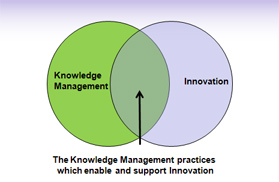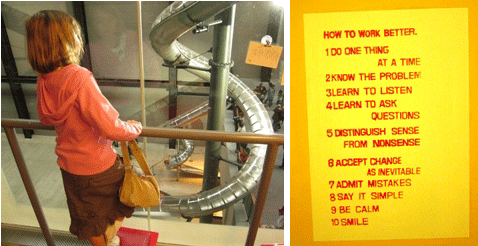The little Peer Assist animation I blogged recently has become a subject of discussion in the Coognitive Edge blog.
I've responsed in the discussion there, but my comment hasn't come out of quarantine yet (it's my first one on the cognitive edge, so I guess I'm being screened), so I'll pick up the thread here for now.
Dave Snowden (whose intellect I respect) makes a few points in his post - an assertion (provocatively distorted) about the nature of the peer assist process, and a comment about the way in which simple methods can be turned into recipes (which I entirely agree with), all sugar-coated with a back-handed compliment.
It's been frustrating to watch the comments build whilst beng unable to respond myself, but interesting to see the way in which the thread has developed. In many ways, it makes the case for Peer Asists better than I could argue it!
The critical distinction that is missing in Dave's assertion and most of the responses which follow, (and this is where Peer Assists are different to the activities that competent managers have been doing naturally for years) is that Peer Assists are primarily designed to share experience - not advice or opinions.
(To give credit to the red facilitator in the animation - she does state that people "offer suggestions based on personal experience". Nancy Dixon echos this in Common Knowledge, where she details the origins of the approach in BP)
Sure, you can get up from your desk and wander around the office picking up advice and opinions. You can Google for them too. But that's not the same as setting up a short meeting in which people only share suggestions based on personal experience.
It's all too natural to shake up a cocktail of opinions, advice, and experience together without checking the ingredients. The Peer Assist process is unnatural insofar as it limits input to personal experience only. And that's where the facilitator, whether red, blue or green, adds value.
So to return to the thread in Cognitive Edge blog - we can see a number of Opinions about what Peer Assists might be, but very little voiced Experience from people who have participated or facilitated one. Rather than exploring the topic openly from the standpoint of experience, there is a natural tendency by some (and perhaps an element of group-think - curmudgeonliness is more contagious than appreciativeness) to deconstruct and conform the approach to elements other models. "Oh a Peer Assist is just ..." "x + y + z = peer assist"
My suggestion is - try one out! Use as much of the recipe as you need for the context of your organisation (thanks Bill Kaplan). For BP's highly facilitative culture where most teams included someone with good facilitation skills, the process needed very little guidance. To quote from Nancy Dixon's Common Knowledge: "BP wisely chose to offer it as a simple idea without specifying rules or lengthy "how-to" steps." In other cultures and contexts - perhaps those for whom the animation was designed - there may be more of a need to provide a recipe.
As I said in my reponse on Cognitive Edge, I suggest watching the animation with a large half-full glass of wine in one hand. Curmudgeonliness just fades away.
NB. Don't try it with a half-empty glass though - somehow it's just not the same.




